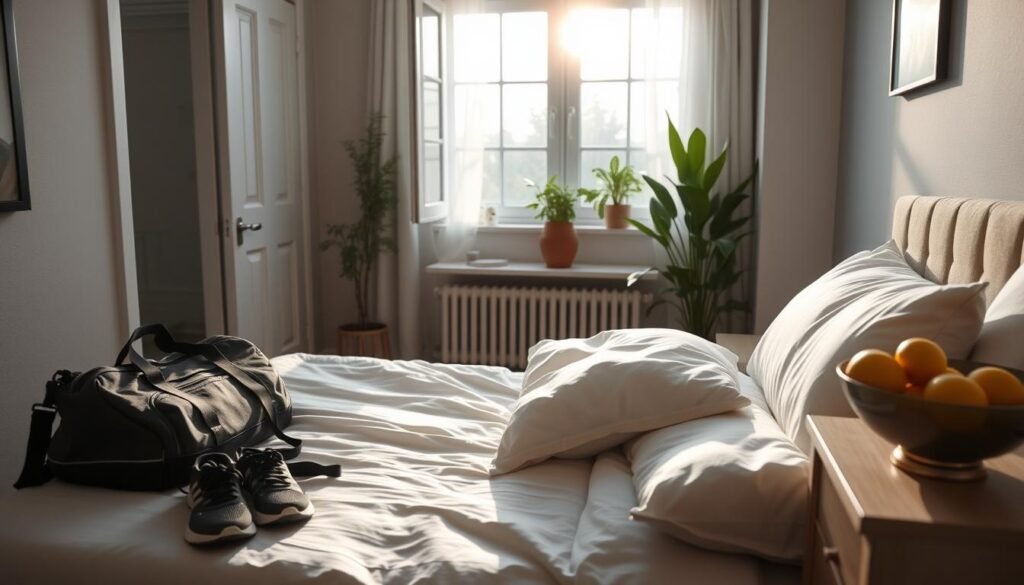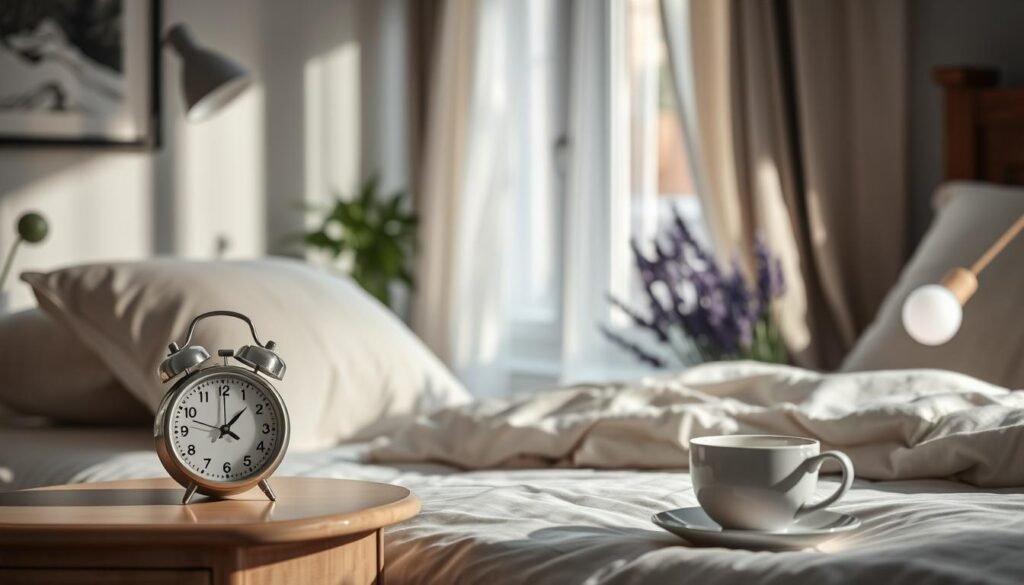It’s shocking but true: nearly 40% of men over 45 face low testosterone levels. This affects their life in big ways. Testosterone is key not just for physical wellness but for good sleep too. Knowing how low testosterone and insomnia are linked is crucial for those with sleep problems. Experts like the National Sleep Foundation suggest adults should get 7-9 hours of sleep a night. Yet, this is hard for some because of hormone issues. Addressing low testosterone can help with better sleep, but knowing the pros and cons is vital.
This article offers insights into treatment options for low testosterone and their effects on insomnia. We will cover symptoms, causes, and treatment plans for a better understanding of hormonal health and sleep. For those suffering from low testosterone, here you’ll find useful information. This can help in balancing hormone levels and getting the restful sleep you need.
Key Takeaways
- Nearly 40% of men over 45 experience low testosterone, impacting sleep.
- Adults should aim for 7-9 hours of sleep for optimal health.
- Testosterone replacement therapy can enhance sleep quality.
- Chronic sleep disturbances can lead to decreased testosterone production.
- Recognizing symptoms of low testosterone is vital for treatment.
- Consultation with a doctor is recommended before starting testosterone therapy.
The Impact of Low Testosterone on Sleep
Low testosterone significantly disrupts sleep cycles. It leads to poor sleep quality. This connection links to how testosterone works with body clocks.
Testosterone levels rise during sleep, peaking in the REM cycle. This is crucial for hormone balance. But, poor sleep lowers testosterone production, creating a harmful loop.
Understanding the Relationship Between Testosterone and Sleep Cycles
Men with low testosterone often have erratic sleep. Those with levels under 300 ng/dL might have Low T. This condition harms sleep quality and increases night wake-ups.
The hormone fluctuates during sleep, especially in REM. When sleep is interrupted, testosterone production drops, worsening health.
The Role of Testosterone in Circadian Rhythms
Testosterone is vital in circadian rhythm regulation. Lower levels can cause broken sleep and increase the risk of sleep apnea. This affects not just hormone levels but also overall health and metabolism.
Improving sleep may boost testosterone levels. It also helps with hormonal balance symptoms.
Symptoms of Low Testosterone
Knowing the symptoms of low testosterone can greatly improve life quality. Many people feel physical and emotional changes when they have this issue. It is helpful to recognize these signs early.
Recognizing Common Indicators
Some common symptoms of low testosterone are:
- Decreased libido
- Fatigue and low energy levels
- Difficulty concentrating
- Changes in body composition, like more body fat
- Less muscle mass and strength
- Problems sleeping, including insomnia
- Feelings of depression and mood swings
People with low testosterone might feel differently. Some don’t show any signs, while others face big challenges every day. Spotting these signs early can help people seek medical advice soon.
How Low Testosterone Affects Mental Health
The link between mental health and low testosterone is complicated. Low testosterone can cause various mental health problems, such as:
- Stronger feelings of depression
- More anxiety
- Problems with thinking and memory
- Overall emotional distress
It’s important to understand these impacts. Men with low testosterone often struggle with their emotional health. Taking care of hormonal health is key to feeling better mentally. It leads to a happier, more stable life.
Causes of Low Testosterone
It’s vital to know what leads to low testosterone to treat it well. Many things can cause it, from natural changes in the body to health problems. A big factor is getting older. Men especially feel this after turning 30.
Age-Related Decline in Testosterone Levels
After 30, men’s testosterone levels drop slowly, about 1% to 2% every year. By 40, many see a big change in their hormone levels. This drop can make them face both physical and mental challenges, affecting their health and happiness.
Health Conditions Linked to Low Testosterone Levels
Other health problems can also make testosterone levels go down. These include:
- Obesity: Too much fat, especially around the belly, can lower testosterone.
- Diabetes: This long-term illness can mess with testosterone production.
- Obstructive sleep apnea: Problems with sleep can hurt testosterone levels and make sleeping worse.
- Chronic illnesses: Diseases like chronic kidney disease and liver disease can reduce testosterone production.
- Medications: Some drugs, like corticosteroids and painkillers, can affect how testosterone is made.
Knowing these causes of low testosterone shows why it’s important to live healthily, keep a good weight, and talk to a doctor if you have symptoms. Understanding the root problems helps in taking steps to manage hormone levels.
| Cause | Description |
|---|---|
| Age | Gradual decline begins around age 30, worsening with age. |
| Obesity | Excess body fat linked to lower testosterone levels. |
| Diabetes | Can interfere with production and regulation of testosterone. |
| Sleep Apnea | Sleep disorders impact hormone levels and overall health. |
| Medications | Certain drugs can negatively influence testosterone production. |
| Chronic Illnesses | Includes conditions like kidney and liver disease affecting testosterone. |
Your Sleep and Hormonal Health
Understanding how sleep problems affect testosterone is key for good health. Sleep issues like insomnia and sleep apnea can harm testosterone production. This can make both sleep quality and hormonal health worse.
Effects of Sleep Disorders on Testosterone Production
There’s a strong link between sleep and testosterone levels. Studies show that cutting sleep to five hours a night made young men’s testosterone drop by 10% to 15%. Such a reduction shows the impact of not getting enough sleep on hormones. Also, older men often have lower testosterone because they don’t sleep well. This gets worse with conditions like sleep apnea, which is common in those with low testosterone.
How Poor Sleep Quality Can Worsen Hormonal Imbalances
Poor sleep doesn’t only impact testosterone. Those with low testosterone often find it hard to sleep through the night. This can lead to even more hormonal imbalances. In women, menopause can lower testosterone, leading to sleep problems and tiredness. Setting a regular sleep schedule and making your bedroom comfortable can improve sleep and hormone balance.
Treatment Options to Manage Low Testosterone and Insomnia
Managing low testosterone and insomnia needs a well-rounded plan for success. Many patients look at different treatments, like hormone therapy and sleep meds. They want to make their lives better.
Testosterone Replacement Therapy: Benefits and Risks
Testosterone Replacement Therapy (TRT) stands out as a key method for low testosterone. It often happens as men get older. The treatment can boost sex drive, mood, and sleep. It can even make sleeping through the night easier.
However, TRT isn’t free from risks. It might make sleep apnea worse. This means more trouble breathing when asleep. Knowing the side effects is key for those thinking about this option. Issues with the prostate and heart risks need a close look before starting TRT. More details are found in research on men’s health.
Medications for Insomnia and Their Impact on Testosterone
Sleep meds are sometimes used when dealing with low testosterone. They offer quick relief from sleep issues. Yet, these meds might change hormone levels. It’s vital to know how they affect testosterone.
For insomnia sufferers, changing habits is also smart. Doing things like sticking to a sleep schedule and unwinding before bed helps. Cutting down on screen time before sleep is good, too. These steps can improve sleep and not harm hormone levels.
Lifestyle Changes for Managing Low Testosterone and Insomnia
Making lifestyle changes is key to tackling low testosterone and insomnia. These changes can help balance hormones and boost well-being. By focusing on exercise and diet, a positive impact on testosterone and sleep is seen.
Implementing Regular Exercise Routines
Physical activity is crucial for raising testosterone. It boosts production and helps you sleep better. Weight lifting, in particular, greatly impacts hormone levels. Mixing cardio with strength training brings even more benefits.
- Focus on strength training at least 2-3 times a week.
- Incorporate cardiovascular activities such as jogging or cycling for heart health.
- Consider high-intensity interval training (HIIT) to maximize testosterone benefits.
Dietary Adjustments to Support Hormonal Health
Diet is key for testosterone and overall health. Choosing nutrient-rich foods supports hormonal balance. A balanced diet with essential vitamins and minerals is best for testosterone.
- Include healthy fats from sources such as avocados, nuts, and olive oil.
- Consume adequate protein to support muscle repair and growth.
- Incorporate fruits and vegetables rich in antioxidants to combat oxidative stress.
| Food Group | Benefits for Testosterone |
|---|---|
| Healthy Fats | Enhance hormone production |
| Lean Proteins | Support muscle health and recovery |
| Fruits and Vegetables | Reduce inflammation and improve overall health |

Natural Remedies to Consider
Looking into natural remedies for low testosterone can offer good options for those who want to improve their hormone levels safely. Herbs and essential vitamins are key in helping with hormone health and making more testosterone.
Herbal Supplements and Their Efficacy
Many herbs are known for their possible role in boosting testosterone naturally. Ashwagandha is especially noteworthy, as research has shown it can really increase testosterone. Men took daily doses of 600 mg to 675 mg for some time. Other important herbs include:
- Fenugreek: This herb may boost testosterone, strength, and sex drive.
- Saw Palmetto: It’s often used for prostate health and may help balance hormones.
- Ginger: Research shows ginger might raise testosterone levels and better metabolic health.
The Role of Vitamins and Minerals in Testosterone Levels
For boosting testosterone, vitamins like Vitamin D, zinc, and magnesium are vital. Studies show that men with enough Vitamin D see a big rise in testosterone after taking it daily. Plus, magnesium helps improve sleep quality, which is tied to testosterone levels. Note that:
- Men with enough zinc often have better testosterone levels and health.
- Many might not know, but about 20% of people lack enough magnesium.
- Eating foods with healthy fats, like avocados and nuts, also helps hormone health.
Sleep Hygiene Practices to Enhance Sleep Quality
Improving sleep quality is key for good health, especially for hormones. Using good sleep hygiene practices makes a big difference in how rested and energetic you feel. Making changes and routines can turn your night into a time of real rest.
Creating a Restful Sleep Environment
A peaceful sleep space is crucial for good sleep. Focus on making it cozy, by:
- Minimizing light exposure by using blackout curtains or sleep masks
- Reducing noise levels with tools like earplugs or white noise machines
- Maintaining a cool room temperature, ideally between 60°F to 67°F
- Ensuring a comfortable mattress and pillows that provide adequate support
To enhance sleep hygiene, remove electronic distractions before bedtime. Establishing a bedtime routine helps your body get ready to sleep. This leads to better sleep over time. Learn more at this source.
Practicing Relaxation Techniques Before Sleep
Using relaxation methods aids in falling and staying asleep. Techniques include:
- Meditation, which calms the mind and reduces stress
- Progressive muscle relaxation, easing tension throughout the body
- Deep breathing exercises to regulate stress responses and promote tranquility
- Gentle yoga or stretching to alleviate physical discomfort before bed
These practices make up a soothing bedtime routine. They improve sleep quality and emotional strength. This ensures you get the rest needed for hormonal balance.

Cognitive Behavioral Therapy for Insomnia
Cognitive Behavioral Therapy for Insomnia (CBT-I) is a strong method for treating sleep issues. It focuses on both cognitive and behavioral elements that lead to insomnia. Research has shown it not only improves sleep quality but overall health. This is especially true for people with chronic conditions like heart failure.
Understanding the Effectiveness of CBT-I
Recent studies highlight CBT-I’s role in lessening insomnia symptoms. These studies show better sleep quality and efficiency through metrics like the Pittsburgh Sleep Quality Index. They reveal CBT-I’s power in aiding those also battling fatigue and depression. Improved sleep has been linked to less daytime tiredness and better mental health.
Behavioral Techniques to Improve Sleep Quality
CBT-I uses behavioral techniques to better sleep quality. These include:
- Sleep restriction therapy to limit time spent awake in bed
- Stimulus control therapy to reinforce the bed as a cue for sleep
- Relaxation training to ease pre-sleep anxiety
- Cognitive restructuring to address negative sleep-related thoughts
These behavioral strategies boost sleep quality and balance hormones, including testosterone. Adopting these techniques can make sleep more restful and rejuvenating.
| CBT-I Techniques | Benefits |
|---|---|
| Sleep Restriction Therapy | Increases total sleep time and efficiency |
| Stimulus Control Therapy | Reduces wakefulness and improves sleep onset |
| Relaxation Training | Lowers anxiety levels associated with sleep |
| Cognitive Restructuring | Addresses negative thoughts around sleep |
CBT-I does more than tackle sleep issues. It takes a comprehensive approach to improving health and wellness.
Monitoring and Managing Treatment
Managing low testosterone treatment well requires checking on it often. Regular health check-ups are very important. They help track testosterone levels and check how well the treatment works. It’s key to know how low testosterone affects health overall.
The Importance of Regular Check-Ups
Check-ups are a must for those getting testosterone treatment. They help check symptoms, hormone levels, and possible side effects. Sadly, many with low testosterone don’t get the help they need. This shows why it’s crucial to be aware and seek help early. Keeping up with health professionals during visits helps keep an eye on the treatment.
Adjusting Treatment Plans Based on Symptoms
Changing treatment plans is sometimes needed to meet health needs. Things like age, health issues, and certain symptoms call for these changes. For example, men with low energy and sexual drive might need a different treatment plan.
Tools like the Androgen Deficiency in Aging Males questionnaire help doctors figure out symptoms better. This lets them adjust treatments to fit the person. Doing this helps people get the most from their treatment and lowers risks.

| Factors for Monitoring | Importance |
|---|---|
| Regular Health Check-Ups | Evaluate hormonal levels |
| Symptom Assessment | Guide treatment adjustments |
| Testosterone Measurement | Ensure accurate dosing |
| Risk Assessment | Identify potential side effects |
Keeping a close watch on testosterone levels and adjusting treatment plans can greatly help. It can improve health outcomes and life quality. For more info on managing low testosterone and sleep issues, check out this resource.
Conclusion
Low testosterone and insomnia are closely linked. One can make the other worse. A look at treatments shows there are many options. These range from changing your lifestyle to trying natural remedies and getting medical help. It’s very important to handle both insomnia and hormonal health carefully. Doing so can make you feel a lot better overall.
If you’re facing both low testosterone and trouble sleeping, getting help is key. Getting the right diagnosis and treatment plan is crucial. This is because hormonal health can get complex. It changes with age and varies from person to person. Talking to doctors is important. They make sure you get the care that fits your needs the best.
Tackling the problem from different angles helps a lot in improving sleep and balancing hormones. Making changes to your lifestyle and getting medical care are both important steps. Focusing on good sleep habits and your overall health helps big time. This way, you can enjoy restful nights and feel more energetic during the day.